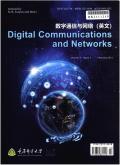LEARN: localized energy aware restricted neighborhood routing for ad hoc networks
IF 7.5
引用次数: 43
Abstract
In this paper, we address the problem of energy efficient localized routing in wireless ad hoc networks. Numerous energy aware routing protocols were proposed to seek the power efficiency of routes. Among them, several geographical localized routing protocols were proposed to help making smarter routing decision using only local information and reduce the routing overhead. However, most of the proposed localized routing methods cannot theoretically guarantee the power efficiency of their routes. In this paper, we give the first localized routing algorithm, called localized energy aware restricted neighborhood routing (LEARN), which can guarantee the power efficiency of its route asymptotically almost sure. Given destination node t, an intermediate node v will only select a certain neighbor v such that < vut les alpha for a parameter alpha < pi/3 in our LEARN method. We theoretically prove that for a network, formed by nodes that are produced by a Poisson distribution with rate n over a compact and convex region O with unit area, when the transmission range rn = radicbetalnl/pin for some beta > pi/alpha, our LEARN routing protocol will find the route for any pair of nodes asymptotically almost sure. When the transmission range rn = radicbetalnl/pin for some beta < pi/alpha, the LEARN routing protocol will not be able to find the route for any pair of nodes asymptotically almost sure. We also conducted simulations to study the performance of LEARN and compare it with a typical localized routing protocol (GPSR) and a global ad hoc routing protocol (DSR)学习:局部能量感知限制邻居路由自组织网络
本文研究了无线自组织网络中节能的局部路由问题。为了寻求路由的能量效率,提出了许多能量感知路由协议。其中,提出了几种地理本地化路由协议,以帮助仅使用本地信息进行更智能的路由决策,减少路由开销。然而,目前提出的大多数局部路由方法在理论上都不能保证路由的功率效率。本文给出了第一种局部能量感知受限邻域路由(LEARN)算法,该算法可以保证其路由的功率效率渐近几乎确定。给定目标节点t,中间节点v只会选择一个特定的邻居v,使得在我们的LEARN方法中,对于参数alpha < pi/3, < vut小于alpha。我们从理论上证明了在单位面积的紧凸区域O上,由速率为n的泊松分布产生的节点组成的网络,当传输范围rn = radicbetalnl/pin时,对于某些β > pi/alpha,我们的LEARN路由协议将找到任意一对节点的渐近几乎确定的路由。当传输范围rn = radicbetalnl/pin对于某些beta < pi/alpha时,LEARN路由协议将无法为任何一对节点找到渐近几乎确定的路由。我们还通过仿真研究了LEARN的性能,并将其与典型的本地化路由协议(GPSR)和全局自组织路由协议(DSR)进行了比较。
本文章由计算机程序翻译,如有差异,请以英文原文为准。
求助全文
约1分钟内获得全文
求助全文

 求助内容:
求助内容: 应助结果提醒方式:
应助结果提醒方式:


